MSN vs DNP: What's the Difference?
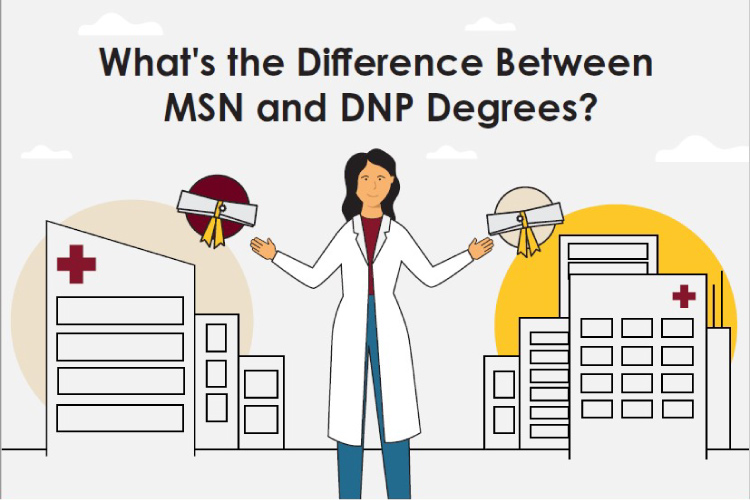
Are you asking yourself, "MSN vs DNP," or just thinking about earning a graduate nursing degree?
Then you may have questions about the difference between the Master of Science in Nursing (MSN) and Doctor of Nursing Practice (DNP) degrees.
Weighing MSN vs DNP degrees can both advance your career. But the ultimate benefit of each depends on your interests and goals.
This article will compare the MSN and DNP in the context of the family nurse practitioner (FNP) specialization.
Nurse practitioners are in great demand. Between 2018 and 2028, the U.S. Bureau of Labor Statistics expects the employment of nurse practitioners to grow 28%. That’s nearly six times the national average.
Your path to becoming an FNP begins with earning an MSN-FNP or a DNP-FNP degree.
Read on to learn the difference between MSN and DNP degrees and why you might choose one over the other.
Click here to download the full version of the MSN vs DNP Infographic.
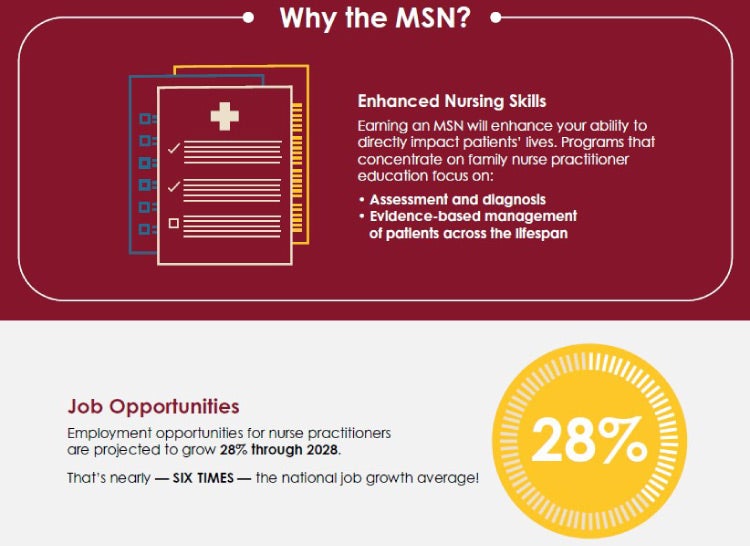
Why Consider an MSN Degree
The MSN will enhance your ability to impact patients’ lives directly.
MSN programs with a concentration in family nurse practitioner education largely focus on assessment, diagnosis, and evidence-based management of patients across the lifespan. That means you’ll graduate with advanced knowledge of nursing and health care.
The difference between MSN and DNP programs is the DNP has an added emphasis on preparing leaders who have specialized knowledge in health care policy, systems-level thinking, quality improvement, interprofessional collaboration, evidence-based practice, data management, health care finance and economics, and population health to improve quality of care and patient outcomes.
Earning the MSN-FNP allows you to become a certified FNP, which is one type of advanced practice registered nurse (APRN). FNPs deliver primary care services to patients of all ages.
From infants and adolescents to adults and seniors, FNPs see individuals and families throughout their lives.
FNPs are trained to practice as autonomous primary care providers. They can:
- Diagnose and treat a range of medical problems
- Help patients make healthy choices and prevent disease
- Prescribe medication within their individual state regulations
Read everything you need to know about being a nurse practitioner here.
An online MSN-FNP program equips BSN-prepared nurses to fill the growing need for primary care providers. The curriculum focuses on preventative care, health care policy, health promotion, clinical assessment, and management.
You’ll build an understanding of nursing science and other critical topics, including:
- Advanced health assessment
- Advanced pathophysiology
- Advanced pharmacology
- Health promotion
- Health care policy
- Health informatics
As a graduate, you’ll be ready to make a difference in the lives of patients and entire communities.
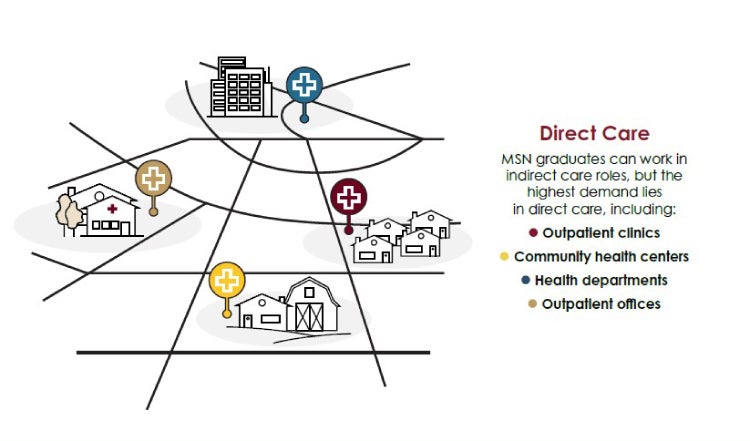
Clinical Practice Focus
MSN graduates can work in indirect care roles, however, the highest demand lies in direct care.
Graduates of an online MSN-FNP program are fully prepared for clinical settings. Our alumni work as FNPs in a variety of clinical settings including outpatient clinics, community health centers, health departments, and outpatient offices.
Wherever you choose to work as an FNP, you’ll be impacting the lives of individuals and families.
The number of patients the average, full-time FNP sees daily varies but the average is about 18 patients per day (Source).
Online programs will also teach you to work collaboratively. Many primary care settings are transitioning to team-based care delivery. So, you’ll need to know how to coordinate with other health professionals and medical staff.
As an MSN-FNP candidate, you’ll explore:
- Interprofessional collaboration
- Nursing leadership
- Health care technology and data management
With a firm understanding of these areas, you’ll be able to fill numerous positions on a healthcare team, including the leader or manager.
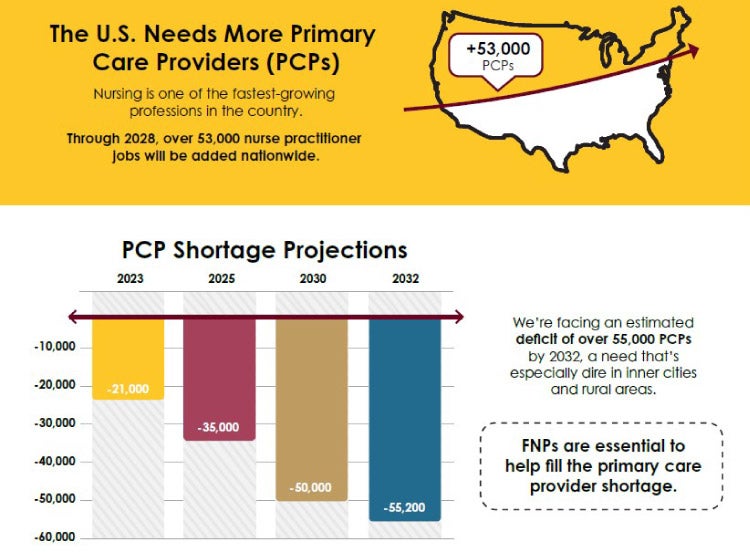
Primary Care Provider Shortage
Earning the MSN-FNP will position you to enter one of the fastest-growing professions in the country. Between 2018 and 2028, the U.S. Bureau of Labor Statistics projects the country will add over 53,000 nurse practitioner jobs.
Why are nurse practitioners in such demand? Health care reform and a large population of aging baby boomers have created a shortage of primary health care providers.
As annual doctor visits rise, the U.S. will face an estimated deficit of 50,000 primary health care professionals by 2030. The need is especially dire in inner cities and rural areas, which tend to be medically underserved.
FNPs can perform many of the same services as primary care doctors. So, they’ll be pivotal in filling the gap for primary care services and physicians.
You, too, can be part of the solution – and create a stable and fulfilling career – by earning the MSN-FNP.
Read everything you need to know about how you can fill the healthcare gap here.
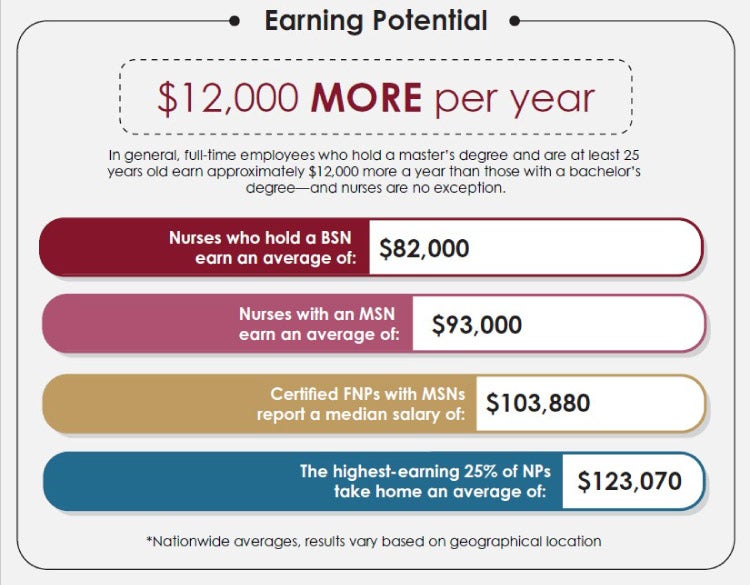
MSN Holders Earn More
According to the U.S. Bureau of Labor Statistics, full-time workers ages 25 and older with a master’s degree earned approximately $12,000 more a year than those with a bachelor’s degree.
This trend also applies to the field of nursing. Workers with a master’s degree in nursing earn a higher average salary than their counterparts with a bachelor’s degree:
With the MSN-FNP, your earnings potential is even higher. U.S. News & World Report notes that nurse practitioners earned a median salary of $103,880 in 2017. The highest-earning 25% of nurse practitioners took home $123,070.
Click here to download the full version of the MSN vs DNP Infographic.
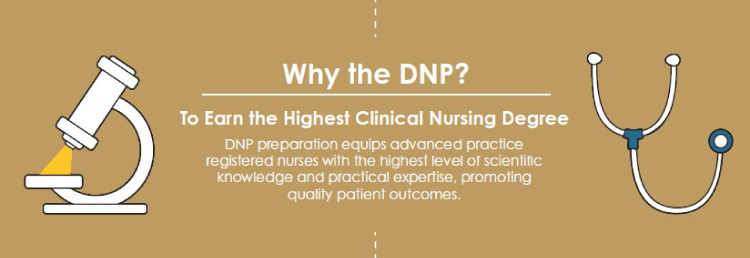
Why Consider a DNP Degree
Health care authorities are calling for APRNs to be doctorally prepared.
APRNs must have at least a master’s degree. But many national health care authorities want to raise preparation to the doctorate level.
In 2004, members of the American Association of Colleges of Nursing (AACN) voted to endorse this position. Other groups also support it, including the National Academy of Medicine and Robert Wood Johnson Foundation.
Their call reflects the standard of other health professions. In medicine, dentistry, and pharmacy, practitioners must hold a doctoral degree.
According to AACN, DNP preparation equips APRNs with the highest level of scientific knowledge and practical expertise. In turn, they can ensure quality patient outcomes.
Universities have recognized the shifting position on APRN preparation. Between 2006 and 2018, the number of DNP programs in the U.S. increased from 20 to 348.
That’s a growth rate of 1640%. All 50 states and the District of Columbia now offer DNP programs (Source).
As more nurses earn the DNP, the difference between MSN and DNP preparation will become more apparent.
Because the DNP may eventually be a requirement for APRNs, it is the smart long-term educational strategy.
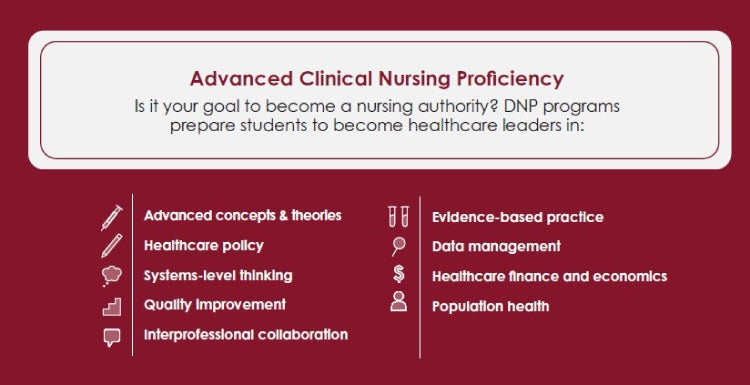
DNP: Clinical Nursing Proficiency at the Highest Level
A major difference between MSN and DNP degrees is that the latter is terminal. In other words, the DNP is the highest degree awarded in clinical nursing practice.
If your goal is to become a nursing authority, then consider the DNP.
DNP programs teach advanced nursing concepts and theories, health care policy, systems-level thinking, quality improvement, interprofessional collaboration, evidence-based practice, data management, health care finance and economics, and population health.
There’s demand for this expertise in a variety of fields. With a DNP, you can work in specialized advanced nursing practice, nursing education, quality improvement, research, and health care administration.
An online BSN to DNP-FNP program will help you change lives as an empowered nurse leader. The program prepares candidates for licensure and allows them to earn their MSN degree along the way.
It’s ideal for registered nurses who have a BSN and are looking to make a broader impact on health care. You'll gain advanced nursing knowledge, a strategic mindset, and leadership skills.
Graduates of the program can move on to become health care leaders in clinical settings and beyond.
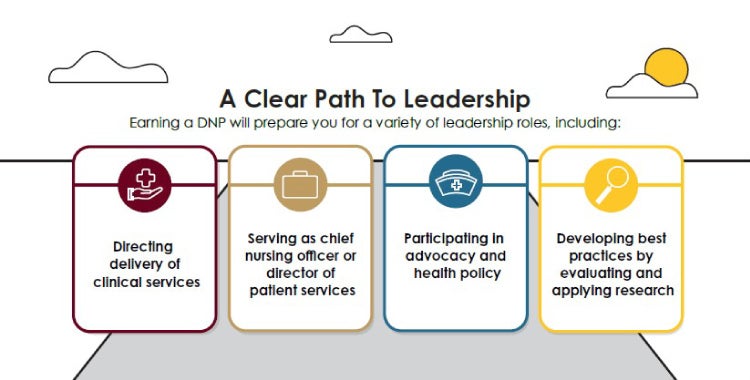
The DNP Leadership Pathway
Leadership potential is another key difference between MSN and DNP degrees.
Because the DNP will prepare you for the highest level of clinical nursing practice, you'll be ready for a variety of leadership roles.
The DNP-FNP, for example, provides several paths to help shape the future of health care. As a graduate, you can:
- Supervise and direct the delivery of clinical services within a health care system or private practice.
- Serve as an organizational manager, such as a chief nursing officer or director of patient services.
- Participate in advocacy and health policy.
- Develop best practices by evaluating and applying research.
Online BSN to DNP-FNP programs train candidates for advanced practice with patients across the lifespan. But it also develops nurse leaders with proficiency in:
- Leadership & Advocacy: Learn how to advocate for impactful change for patients and populations in need through interdisciplinary leadership, policy knowledge, and applied quality improvement.
- Organizational Management: Leverage your leadership skills in organizational and health systems management to foster collaboration and boost the safety and quality of health care.
- Data-Driven Quality Improvement: Strengthen your research and strategy capabilities to resolve organizational issues, implement evidence-based changes, and improve outcomes for patients and organizations.
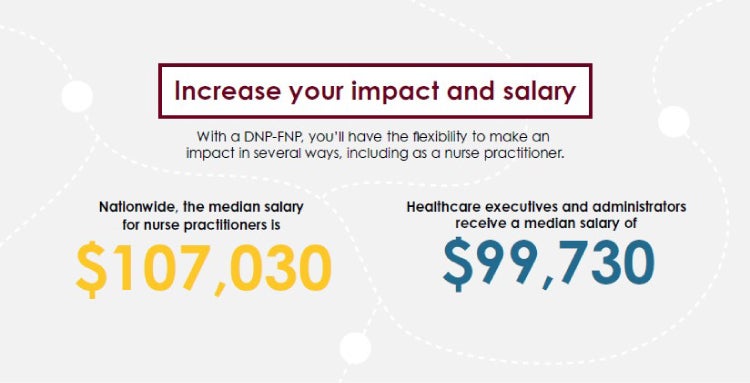
Impactful Work and a Good Salary
With the DNP-FNP, you’ll have the flexibility to make an impact in several capacities.
One, of course, is a nurse practitioner. U.S. News & World Report ranks nurse practitioner among the top 10 Best Jobs in the nation, health care, and STEM. Nationwide, the median salary for nurse practitioners is $107,030.
You can also apply the DNP-FNP in the thriving field of health care administration.
The U.S. Bureau of Labor Statistics expects employment to grow by 18%, which is over three times the national average (Source).
According to U.S. News & World Report, medical and health services managers rank in the top 30 Best Jobs in the nation, business, and STEM.
In addition to outstanding job growth and satisfaction, health care executives and administrators receive a substantial income. The median salary is $99,730.
More broadly, the difference between MSN and DNP salary is evident. According to PayScale.com, individuals with a DNP earn a higher average income than those with the MSN:
Click here to download the full version of the MSN vs DNP Infographic.

MSN vs DNP: Program Length
You can complete BSN to MSN programs in roughly two to three years full-time (Source). A BSN to DNP program will take up to five years.
Online MSN-FNP program candidates can graduate in as little as two and a half years. For just 16 additional credits, you can graduate with the DNP-FNP.
Both programs provide excellent flexibility. There are minimal set log-in times, which means you can learn whenever it fits your schedule. Many candidates work towards their degree while continuing to work full-time.
From day one through graduation, the program experience is meaningful and supportive.
Courses are delivered in an engaging, faith-driven learning environment that empowers candidates to reach their goals.
To keep you on the path to success, online programs offer:
- Dedicated support resources and one-to-one coaching from a student success advisor
- A community of caring and experienced nursing faculty
- Small class sizes
MSN vs DNP: Tuition Differences
The tuition difference between MSN and DNP programs is partly due to program length. MSN programs have fewer credit hours and, therefore, typically lower tuition.
Online MSN-FNP and BSN to DNP-FNP programs have one of the most affordable tuition rates.
Each credit hour is $705, and candidates also benefit from flexible financial aid.
As you weigh your options for graduate nursing education, be sure to speak with your employer. Many organizations offer tuition reimbursement.
As part of your employer’s tuition assistance package, you may need to continue working there for a certain amount of time. Generally, the expectation ranges from two to five years.
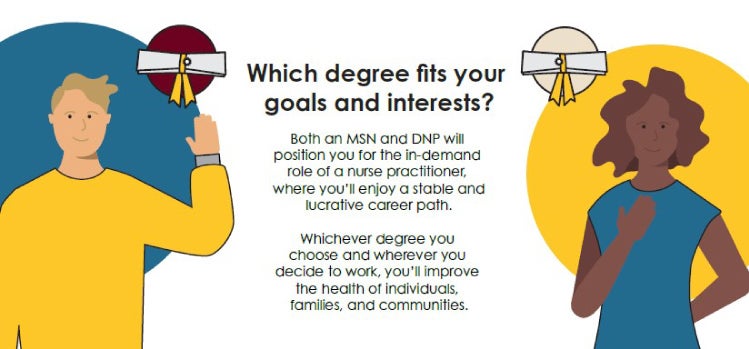
Career Goals and Interests
While there are significant similarities, the differences between MSN and DNP degrees are just as important.
Both the MSN-FNP and BSN to DNP-FNP will position you for the in-demand role of a nurse practitioner. Nurse practitioners enjoy a stable and lucrative career path that enables them to impact patients’ lives directly.
But earning a DNP-FNP is the smart long-term educational strategy. That’s because the minimum preparation level for APRNs will likely shift from a master’s degree to a doctoral degree.
The highest demand for nurses with a master’s degree is in a clinical setting. With the DNP-FNP, you may have more career flexibility and will be ready for leadership roles in health care.
Whichever path you take, a graduate degree in nursing will certainly develop you as a confident leader in health care.
Click here to download the full version of the MSN vs DNP Infographic.

MSN vs DNP: Walsh University Online
Advance your nursing career with an online degree from Walsh University, which U.S. News & World Report named as number 58 on their list of the Top 100 Best Value Schools.
Our dedicated admissions counselors are available to answer your questions.
Take the first step toward an online MSN-FNP or BSN to DNP-FNP degree today.
Read more of Walsh University Online's top nursing blogs below:
1. Today and Tomorrow: How Are FNP Jobs Trending?
2. How Nursing Has Changed with Technology
3. Doctor of Nursing Practice: Is a DNP the Right Degree for You?

